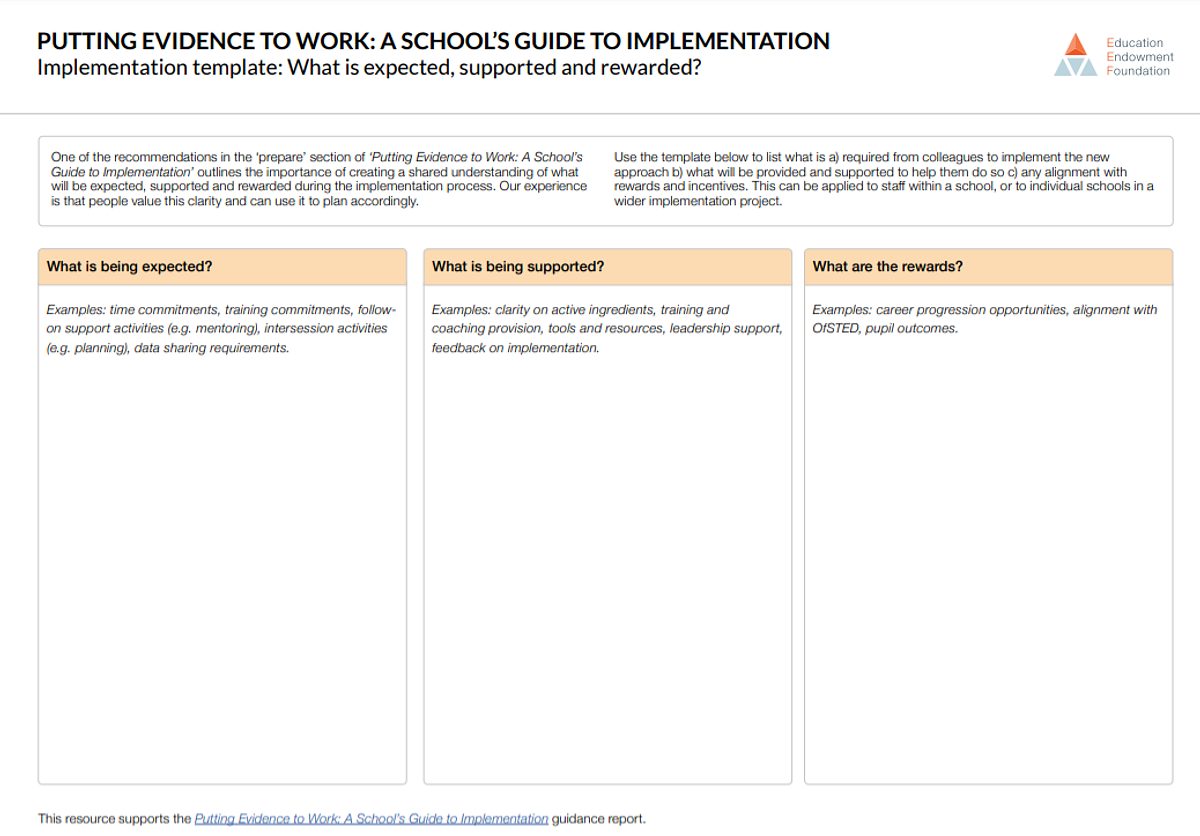
Blog -
Scaffolding to Support Working Memory Demands: Questions for Reflection
We share questions and resources to unpick the EEF’s Voices from the Classroom

Share on:

by Bradford Research School
on the
There are many reasons why implementation can fail. One of them is poor communication. This is a clear message from the EEF’s School’s Guide to Implementation, where they state that we need to ‘Create a shared understanding of the implementation process and provide appropriate support and incentives.’ In the ‘prepare’ phase of implementation, we can think about what must be communicated in order to get that shared understanding:
Having decided to commit to a new approach, school leaders need to create a common and explicit understanding of what will be expected, supported, and rewarded during the implementation process.
Among the extensive resources to support the implementation guidance is a template to help with this, and to consider what will be expected, supported and rewarded. Considering these will help you to clarify whether you have the right things in place and help you to communicate them when you do.

What is being expected?
It is important to set out in advance what will be expected during the implementation process. In most cases there will be time commitments. Time out of school to attend training, meetings, twilight sessions etc. All of this needs to be clear. Sometimes this will be a factor in whether something is able to proceed, but often we see a lack of communication or a lack of understanding of the time commitments required in an intervention. And this leads to drop-out rates, poor implementation and sometimes resentment. Even when there are no additional time commitments per se, people may need to be made aware of impacts on current uses of time, e.g. a whole-school literacy intervention may impact on what can be covered in subject meetings.
And it’s not just time for the training. Effective training doesn’t just mean attending sessions. It could be intersession tasks such as planning, coaching discussions, asynchronous CPD. There may well be requirements on data reporting, perhaps even additional tasks to create particular monitoring measure.
If you look at all of the requirements during the planning stage and see that it might be too much, you can adjust what is required. Or you can increase support.
What is being supported?
Wherever there are expectations, there needs to be support to meet those. Leaders should think about how they create the space, time, and capacity for effective implementation. If we expect attendance at training, then that training needs to be designed well to support them in implementation.
Leaders can support too with clarity on the active ingredients. These should be clearly communicated from the outset, but also modelled heavily. Examples should be writ large, along with non-examples. Teachers should never be in any doubt what the active ingredients are. Read more about active ingredients in this detailed guide from the EEF.
The EEF set out a number of recommendations for professional development in the implementation process. These can help to ensure that you can plan the right support.
a. Treat professional development as one part of a package of implementation strategies
b. Effective professional development includes both initial training as well as high-quality follow-on coaching
c. Introduce new skills, knowledge and strategies with explicit up-front training
d. Reinforce initial training with expert follow-on support within school
e. Use highly skilled coaches
f. Carefully structure and monitor peer-to-peer collaboration
g. Professional development activities should be appropriately spaced and aligned — avoid one-off inputs
h. Ensure a tight focus on pupil outcomes by supporting staff to apply general pedagogy to specific subject domains
Having a feedback mechanism is important. Seeing implementation as a process which needs to be worked on, with adjustments if necessary, and having a very clear and positive means of providing feedback from and to those implementing something is important. Like everything else, this should be communicated from the start and consistently throughout the process.
What is being rewarded?
Rewards and incentives need also to be considered in advance. By far the biggest reward should be the difference that the intervention can make. If the ‘explore’ stage has identified something in the school which is amenable to change, and the evidence points towards an intervention that is likely to have a positive impact, we can communicate that clearly. So we broadcast that the ultimate reward for this is in pupil outcomes. Interventions can be aligned with the school’s values, so the rewards are in strengthening that idea of school culture.
Leaders of implementation in schools should be pro-active in identifying behaviours that are conducive to good implementation, and celebrate them. This could be related to the specific project or more general approaches. If a subject lead creates an implementation plan for their approach to a separate project, this could be shared widely. Whatever leaders pay attention to and reward will be more highly valued by staff. Conversely, effective behaviours which are never ‘noticed’ and rewarded, are not being promoted.
For a specific intervention, we should be highlighting the adherence to active ingredients and rewarding the intelligent adaptations which remain true to active ingredients but show innovation. We should be positive about helpful feedback which may at first seem like criticism, but actually makes the intervention stronger.
Three questions that we can ask to support our communication, but they will also improve our implementation planning too:
What is being expected? What is being supported? What is being rewarded?

Blog -
We share questions and resources to unpick the EEF’s Voices from the Classroom

Blog -
Investing in Subject Knowledge has Multiple Benefits

Blog -
Success is an important factor in motivation – how do we reconcile that with desirable difficulty?
This website collects a number of cookies from its users for improving your overall experience of the site.Read more